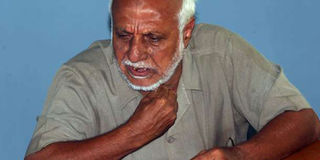Bamahriz: A man who was not afraid of confronting tyranny

Mohamed Salim Bamahriz, brother to the late Ahmed Salim Bamahriz, speaks to a Nation reporter on October 2, 2016. Unlike many prominent people who milk maximum publicity from minimal favours, Bamahriz never sought credit or recognition for help bestowed on others. FILE PHOTO | LABAN WALLOGA | NATION MEDIA GROUP
What you need to know:
- He, together with Liyai Luyai of Shimanzi Ward, were among the early converts to the spirit of multipartyism in Mombasa.
- Other members of the Ford 4 were Masinde Muliro, Martin Shikuku and Jaramogi Oginga Odinga, now all deceased.
Not many Kenyans may remember his name or might have recognised his picture when news of his death was announced early this week, but there is no doubt that Ahmed Salim Bamahriz was one of the country’s uncelebrated political giants.
My first encounter with Bamahriz was in 1990 when I worked briefly as the Mombasa bureau chief for Kenya Times.
At the time, Bamahriz was a vocal civic leader in the municipal council.
He, together with Liyai Luyai of Shimanzi Ward, were among the early converts to the spirit of multipartyism in Mombasa.
It did not take long for Bamahriz to volunteer his considerable family resources (his ancestors came from a wealthy Yemeni family) to the multiparty crusade in Kenya.
Bamahriz — an affable personality and gifted public speaker — was the indisputable voice of democratic reforms that stirred the Coast Province, a region that disdained overt politics.
His entry into the national limelight brought him into direct and constant confrontation with Coast political supremo, Shariff Nassir, a man whose word was law. But nothing scared Bamahriz.
As a ‘card-carrying’ member of the Ford 4 — the name tag given to the original four members of the Forum for Restoration of Democracy pressure group — Bamahriz was single-handedly instrumental in popularising the reform movement in the coastal region.
Other members of the Ford 4 were Masinde Muliro, Martin Shikuku and Jaramogi Oginga Odinga, now all deceased.
Bamahriz was gifted with quick political wit.
When President Daniel arap Moi dismissed him as a foreigner who had no business commenting or participating in Kenyan politics, Bamahriz, tongue-in-the-cheek quipped: “Basi nikipanda meli kuelekea Yemen, Rais Moi naye atapanda ngamia kuelekea Sudan maana jamii yake yatoka Sudan. (When I board a ship to go to Yemen, President Moi should get on a camel to go to Sudan because his ancestors came from Sudan).”
From that day, the issue of his heritage was never part of national discourse.
Bamahriz never shied away from helping friends when in need, no matter the risk.
GENTLE HEART
I encountered him again in April 1992 when the publisher and journalists of Society magazine, who included Pius and Loyce Nyamora, Mukalo wa Kwayera, Laban Gitau and myself, were arrested in Nairobi and charged in a Mombasa court with sedition.
The court imposed stiff bail terms, including a requirement for hefty cash surety.
For several days, there was no one to post bail for us so it was back to Shimo la Tewa Prison.
When Bamahriz heard of our plight, he came to our assistance immediately.
He paid the cash surety running into hundreds of thousands of shillings and gave property title deeds to stand us bail.
Unlike many prominent people who milk maximum publicity from minimal favours, Bamahriz never sought credit or recognition for help bestowed on others.
Instead, he would turn self-effacing and dismiss you with wave of hand: “Wee wacha. Maisha ni kusaidiana. (Stop it. Life is about helping one another)” when you thanked or tried to remind him of how helpful he had been.
That was Ahmed Salim Bamahriz; a towering giant of a man with a generous gentle heart and soul. Fare thee well the last of the Ford 4.
The views expressed in this article are personal reflections. Mr Njoka is strategic communications adviser/director at the ministry of Interior and Coordination of national government.




